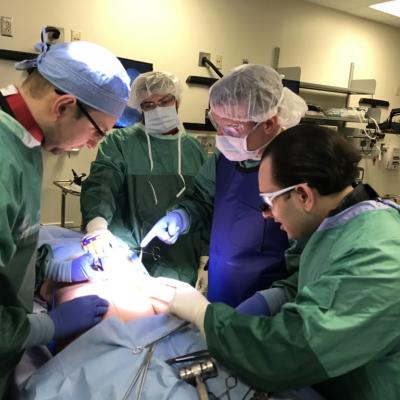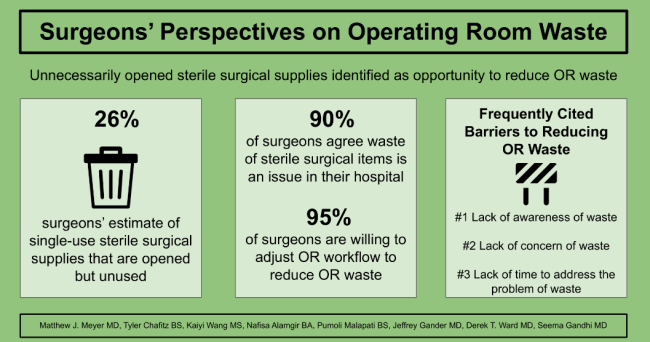Surgeons Want Eco-friendly Operating Rooms
By Pumoli Malapati ('22)
In the summer of 2019, I began working as a UVA Green Labs intern to promote and implement initiatives in laboratories to reduce waste, water and energy consumption. Some of my responsibilities included managing the Green Labs Certification program, organizing the Green Labs resource fair, and participating in cold-storage inventories and assessments around Grounds.
I was amazed at the scientific community’s willingness to have open discussions and encourage implementation of sustainable practices into their work spaces. Having been a part of a huge movement in promoting sustainable practices in the laboratories really opened my eyes up to the vast number of opportunities available to reduce our carbon footprint in critical spaces, such as healthcare. This valuable experience propelled me to continue to engage in waste-reduction initiatives post-graduation.
The healthcare sector is estimated to account for 4.4% climate impacts caused by human activities. Operating rooms (OR) are responsible for approximately 20% to 33% of total hospital waste and account for a major portion of energy consumption. It is important that there is continued research and discussion around how to cut waste within the health sector without compromising patient outcomes.
I was interested in learning more about how members in the UVA Health system in particular perceive their own carbon footprint, so I reached out to principal investigators in that unit. I became involved with an initiative collaborating with UVA Health anesthesiologist Dr. Matthew Meyer and the University of California, San Francisco (UCSF).
Together our research team designed a novel survey that was distributed to all attending and trainee surgeons to understand OR waste perspectives. Our goal was to determine if there were opportunities for waste reduction that could garner surgeons’ support.
Our study found the following results: 90% of participants acknowledged that waste is a concern in the OR, an overwhelming majority of surgeons (95%) agreed or strongly agreed that they would be willing to adjust their workflow to reduce OR waste. Further, respondents estimated that 26% of single-use sterile surgical supplies went unused during surgery which are to be discarded if opened due to strict protocols.
The results of this study revealed that OR waste was an issue across all surgical departments at UVA and surgeons are willing to adjust to make a change, which is encouraging for facilitation of further sustainability efforts within UVA Health. Surgeons are crucial to OR decisions and, as evidenced by this study, important stakeholders for waste reduction efforts.
Our manuscript was selected as “Best in Surgery” by the journal Surgery and published with an editorial entitled “A call to arms to implore surgeons to be involved in managing operating room waste” by former UVA Health vascular surgeon (and current University of Florida Chair of Surgery) Dr. Gilbert Upchurch Jr.
In relation to UVA’s broader goals, this study fits well into the University’s 2020-2030 Sustainability Plan. This study will be a primary stepping stone in helping the University reduce its waste footprint to 30% by encouraging both departmental and University-wide collaboration and discussion about mitigation strategies.
There are always choices to be made in healthcare and initiatives similar to this catalyze stakeholders within the health system to think about how to make patient health a priority while reducing waste and promoting sustainability.
If interested in participating in health system focused sustainability initiatives or to learn more, please contact Dr. Meyer at [email protected], or the Office for Sustainability at [email protected].
Pumoli Malapati is a recent Biology and Global Public Health graduate who worked as a Green Labs Intern for two years during her time at UVA. She is building on her sustainability work post-graduation to better understand how to implement sustainable practices into clinical settings.



